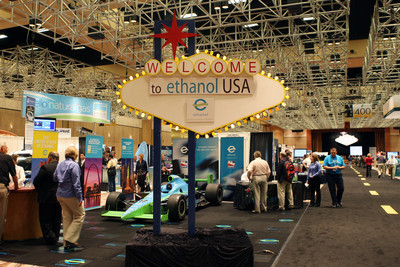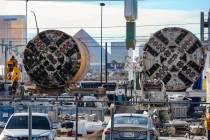No strong alternative to gasoline

Can we all agree there’s a fuel crisis?
Up to now, many Americans haven’t been too worried about oil and its effects on the environment, or the world unrest that seems to be at the heart of the black liquid. I make that judgment based on the number of SUVs and pickups on the road.
But forget all that nonsense. What really bothers us is how the price of oil affects our wallets. And that problem doesn’t seem to be going away.
The Alternative Fuels & Vehicles National Conference + Exposition was at the Rio this week, and I went there with hope, expectations and an open mind.
I walked away even more concerned about the fuel future.
“Don’t wait for the perfect alternative fuel. There ain’t one,” said Sam Swearngin, fleet manager for the city of Kansas City, Mo., as he addressed fellow fleet managers from across the nation.
Swearngin’s words echoed loudest among the messages I took away from the conference: There’s no silver bullet to cure the fuel crisis.
Most of the ideas being bandied about at the conference were as old as automobiles themselves.
Biodiesel vehicles, which use fuels made from plants such as soybeans, are similar to the first diesel engine created by Rudolf Diesel, who ran his using peanut oil.
Henry Ford built an automobile that ran on ethanol, a form of alcohol produced from corn.
The first electric vehicle dates back to the 19th century.
The reason these ideas never made it into the mainstream was because none was as efficient as gasoline. Back then, gasoline was the silver bullet.
Today there are other options: hydrogen fuel cells, compressed natural gas, methane captured from garbage dumps.
But each has its problems.
Increased use of ethanol is being blamed for a world hunger crisis, though something tells me that the higher price of gasoline and diesel used to cultivate and transport food might be a part of the problem.
Some, like the electric car, might appear more appealing environmentally. But the electricity used to fuel the cars would come from coal-powered plants or other environmentally unfriendly sources.
Compressed natural gas requires such a large fuel tank it would eliminate the trunk in most of today’s vehicles.
Hydrogen fuel cells are, at this point, too expensive to be commercially viable on a large scale.
It would take about a decade to develop these fuels into vehicles that can be mass produced, said John O’Dell, senior editor of Green Car Advisor, Edmunds.com.
John Dinkel, who has spent more than 30 years as an automotive author, consultant and journalist who has edited for Road & Track magazine, didn’t have a positive outlook.
“I look at all the alternative fuel projects … and I equate that with Band-Aid engineering,” he said. “I don’t see any real alternative solutions” to fossil fuels.
Dinkel suggests that what needs to happen is government-sponsored research into every type of alternative fuel and the development of more efficient and longer-lasting batteries, something akin to a “Manhattan Project” for fuel.
In the meantime, the world is not producing more oil, but consumption is continuing to rise.
People in China and India are buying more and more automobiles. As both countries continue to industrialize, their use of oil will increase.
Experts are predicting $200 a barrel for crude oil and $7 for a gallon of gasoline in the United States within the next few years.
While no one really knows for sure when we will run out of oil or how much is actually left — folks in Brazil just found a whole bunch off their coast — the demand is still growing and production is not.
Maybe we have 50 years of oil left. Maybe 100. Maybe more.
I wonder if it matters, because who’s going to be able to afford it?
If you have a question, tip or tirade, call the Road Warrior at 387-2904, or e-mail him at roadwarrior@reviewjournal.com or fmccabe@reviewjournal.com. Please include your phone number.
The Las Vegas Public Works Department has begun a $2 million improvement project on Summerlin Parkway. The work is expected to be completed by June 1, as crews repave the six-mile freeway from U.S. Highway 95 to the Las Vegas Beltway and add a third westbound travel lane from U.S. 95 to Buffalo Drive.Watch for the following traffic disruptions this week:
From 8 tonight to 8 p.m. Monday, westbound Summerlin Parkway will be reduced to one lane from Buffalo Drive to Town Center Drive. The westbound offramp at Durango Drive and the Rampart Boulevard onramp and offramp also will be closed.
From 8 p.m. Monday to 8 p.m. Tuesday, westbound Summerlin Parkway east of Town Center Drive to the Las Vegas Beltway will be reduced to one lane. The westbound onramps and offramps at Town Center and Anasazi Drive will be closed. To accommodate commuters, the Town Center offramp will be open Tuesday from 6 a.m. to 9 a.m. and will then reopen at 2 p.m.
From 8 p.m. Tuesday to 8 p.m. Wednesday, eastbound Summerlin Parkway will be reduced to one lane from the Las Vegas Beltway to just east of Town Center Drive. The eastbound Anasazi Drive and Town Center onramps and offramps will be closed.
From 8 p.m. Wednesday to 8 p.m. Thursday, eastbound Summerlin Parkway will be reduced to one lane from east of Town Center Drive to Buffalo Drive. The eastbound Rampart Boulevard and Durango Drive onramps will be closed. The Durango onramp will be open to traffic from 6 a.m. to 10 a.m. and will be reopened by 4 p.m.
REVIEW-JOURNAL


















